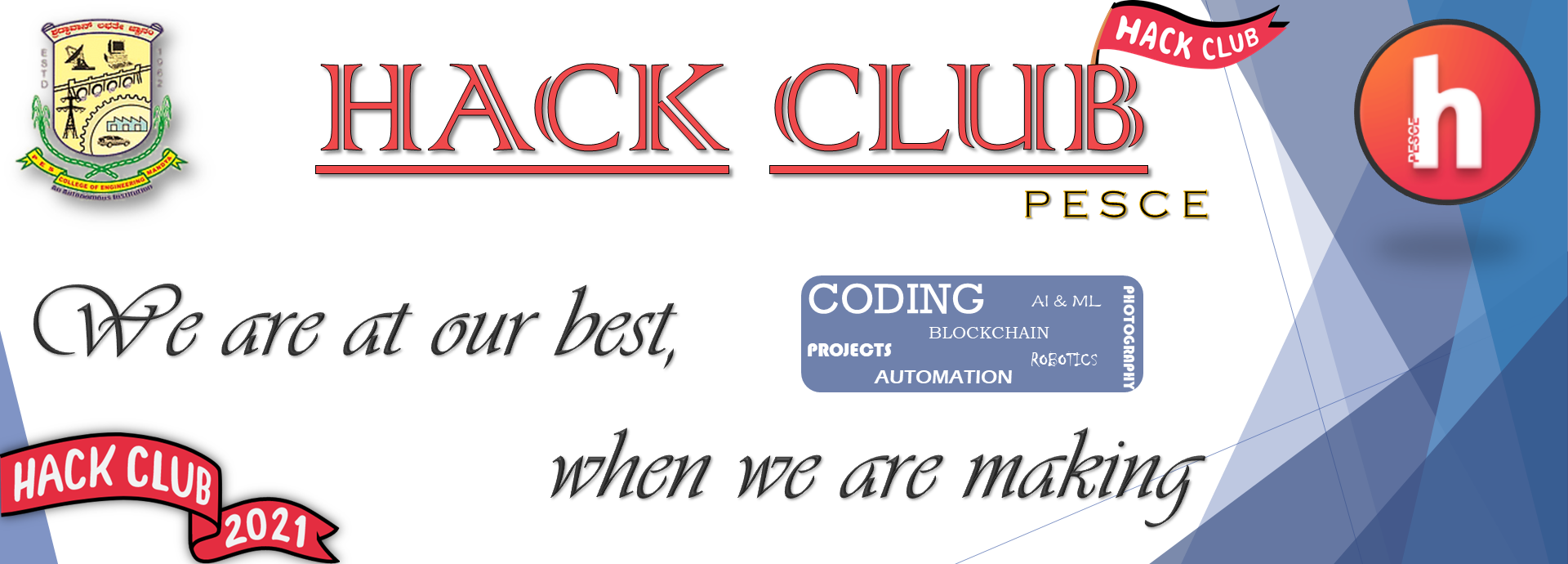Program Overview
Established in 1983, the Department of Computer Science and Engineering (CS&E) is committed to delivering quality education and shaping future-ready professionals. With a strong emphasis on both theoretical foundations and practical skills, the department equips students to thrive in a rapidly evolving tech landscape. The program follows an Outcome-Based Education (OBE) model under a Choice-Based Credit System (CBCS), allowing students to personalize their learning journey and pursue their career goals with confidence. With an annual intake of 240 students, The department is powered by a team of highly qualified and experienced faculty members, expertise across various domains of Computer Science. Our faculty are known for their excellence in teaching, mentorship, and research.
The department also offers a Ph.D. program in Computer Science and Engineering, which was introduced in 2004, fostering advanced research and innovation.
Highlights
Total Intake(CS&E department)
240
Total Intake(CS&E (AI & ML))
60
Total Intake(CS&E (Data Science))
60
Total Intake(Computer Science & Business Systems )
60
Program Type
UG
Duration
4 Years
- About Course
- NBA
- Faculty
- Placement
- Research
- Professional Clubs & Chapters
- Centre of Excellence
- Achievements
- Activities
- Results & Role of Honor
- MOOCs
Academic programs offered
UG Program
- Bachelor of Engineering (B.E.) in Computer Science and Engineering (CSE) with approved intake of 180 students and a lateral entry of 10% from 2nd year.
- Bachelor of Engineering (B.E.) in Computer Science and Engineering (Artificial Intelligence and Machine Learning) with approved intake of 60 students.
PG Program
- M. Tech Programme in Computer Science and Engineering with approved intake of 18 students.
- M.Sc. (Engineering) by research
Research Program
- Ph.D.
Vision
"The Department of Computer Science and Engineering shall create professionally competent and socially responsible engineers capable of working in global environment."
Mission
- DM1: Enforce best practices in teaching-learning, with dedicated faculty and supportive infrastructure to impart the knowledge in emerging technologies. {Required to create professionally competent engineers}.
- DM2: Improve Industry-Institute relationship for mutual benefit. {Required to create professionally competent engineers}
- DM3: Inculcate ethical values, communication and entrepreneurial skills. {Required to create professionally competent and socially responsible engineers}.
- DM4: Sensitize social, legal, environmental and cultural diversity issues through professional training and balanced curriculum. {Required to create engineers capable of working in global environment}
Program Educational Objectives (PEOs)
Graduates of the program will be able to
- Have Successful computer professional career in IT industry and related areas
- Pursue higher education in engineering or management with the focus on intensive research and developmental activities.
- Develop their career as entrepreneurs in a Responsible,Professional and ethical manner to serve the society
Knowledge and Attitude Profile (WK)
- WK1: A systematic, theory-based understanding of the natural sciences applicable to the discipline and awareness of relevant social sciences.
- WK2:Conceptually-based mathematics, numerical analysis, data analysis, statistics and formal aspects of computer and information science to support detailed analysis and modeling applicable to the discipline.
- WK3:A systematic, theory-based formulation of engineering fundamentals required in theengineering discipline.
- WK4:Engineering specialist knowledge that provides theoretical frameworks and bodies of knowledge for the accepted practice areas in the engineering discipline; much is at theforefront of the discipline.
- WK5:Knowledge, including efficient resource use, environmental impacts, whole-life cost,re- use of resources, net zero carbon, and similar concepts, that supports engineering design and operations in a practice area.
- WK6:Knowledge of engineering practice (technology) in the practice areas in the engineering discipline.
- WK7:Knowledge of the role of engineering insociety and identified issues in engineering practice in the discipline, such as the profession nal responsibility of an engineer to public safety and sustainable development.
- WK8:Engagement with selected knowledge in the current research literature of the discipline, awareness of the power of critical thinking and creative approaches to evaluate emerging issues.
- WK9:Ethics, inclusive behavior and conduct. Knowledge of professional ethics, responsibilities,and norms of engineering practice. Awareness of the need for diversity by reason of ethnicity, gender, age, physical ability etc. with mutual understanding and respect, and of inclusive attitudes.
Program Outcomes (POs)
Engineering Graduates will be able to
- PO1: Engineering Knowledge: Apply knowledge of mathematics, natural science, computing, engineering fundamentals and an engineering specialization as specified in WK1 to WK4 respectively to develop to the solution of complex engineering problems.
- PO2: Problem Analysis:Identify, formulate, review research literature and analyze complex engineering problems reaching substantiated conclusions with consideration for sustainable development. (WK1 to WK4)
- PO3: Design/Development of Solutions:Design creative solutions for complex engineering problems and design/develop systems/components/processes to meet identified needs with consideration for the public health and safety, whole-life cost, net zero carbon, culture, society and environment as required. (WK5)
- PO4: Conduct Investigations of Complex Problems:Conduct investigations of complex engineering problems using research-based knowledge including design of experiments, modelling, analysis & interpretation of data to provide valid conclusions. (WK8).
- PO5: Engineering Tool Usage:Create, select and apply appropriate techniques, resources and modern engineering & IT tools, including prediction and modelling recognizing their limitations to solve complex engineering problems. (WK2 and WK6)
- PO6: The Engineer and The World:Analyze and evaluate societal and environmental aspects while solving complex engineering problems for its impact on sustainability with reference to economy, health, safety, legal framework, culture and environment. (WK1, WK5, and WK7).
- PO7: Ethics:Apply ethical principles and commit to professional ethics, human values, diversity and inclusion; adhere to national & international laws. (WK9)
- PO8: Individual and Collaborative Team work:Function effectively as an individual, and as a member or leader in diverse/multi-disciplinary teams.
- PO9: Communication:Communicate effectively and inclusively within the engineering community and society at large, such as being able to comprehend and write effective reports and design documentation, make effective presentations considering cultural, language, and learning differences
- PO10: Project Management and Finance:Apply knowledge and understanding of engineering management principles and economic decision-making and apply these to one’s own work, as a member and leader in a team, and to manage projects and in multidisciplinary environments.
- PO11: Life-Long Learning:Recognize the need for, and have the preparation and ability for i) independent and life-long learning ii) adaptability to new and emerging technologies and iii) critical thinking in the broadest context of technological change. (WK8)
Program Specific Outcomes (PSOs)
he Under Graduate (UG) of B.E Computer Science & Engineering Program has defined Program Specific Outcomes (PSO) which are listed below.
- PSO-1: Ability to apply problem solving skills in developing solutions through fundamentals of Computer Science and Engineering.
- PSO-2:Ability to apply Analytical Skills in the field of Data Processing Systems.
- PSO-3: Ability to design and develop applications through Software Engineering methodologies and Networking Principles.
| Program Name | Duration | Start | End |
|---|---|---|---|
| Computer Science & Engineering | 3 years | 2021 | 2024 |
| Computer science& Engineering | 3 years | 2024 | 2027 |
| Name of Technical Staff | Designation |
|---|---|
| G.K. Thiruneelakantaswamy | Comp. Operator |
| M.S. Sunitha | Comp. Operator |
| A.L. Shobharani | Comp. Operator |
| K C Sumalatha | Comp. Operator |
| M.K. Vidhyashree | Com. Instr |
| Yashwanth G K | Instructor |
| Chinnegowda | Asst. Instructor |
| K. Sreedhar Prasad | System Admin |
| Preetham Edigar M S | System Admin |
| Shalini | SDA / Comp. Optr. |
| Vivekananda M N | Helper |
| Shubha | Instructor |
| Sanjana V | Instructor |
| Mahesh Kumar | Helper / Mechanic |
| Manohara H.S. | Helper |
| Manjunath H N | Helper |
| Shobha | Helper |
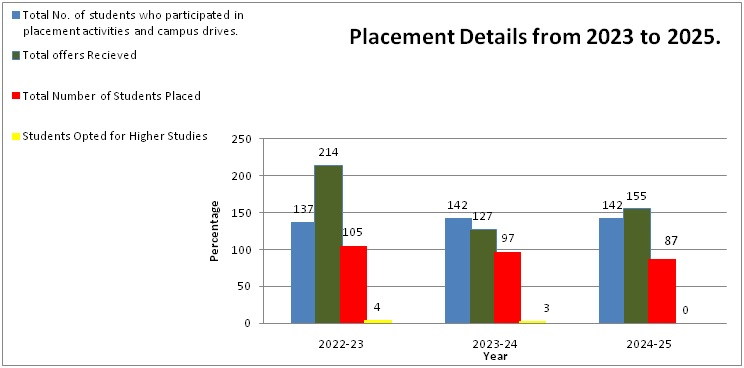
ISTE PESCE CHAPTER
Indian Society for Technical Education is a professional organization of engineering educators and educational administrators. It is a society registered under the societies Registration Act XXI of 1860. The principle objective of ISTE is to advance the cause of education in general and all its functions which pertain to engineering and also to serve as common agency for simulating and guiding its members to formulate strategies for development of technical education and research.
ISTE had been engaged in a variety of programmes and actions leading to the upgradation and modernization of present day curriculum, faculty and educational infrastructure so as to make the technical education in India comparable with that in the advanced countries.
PES College of Engineering, Mandya became Institutional Member of ISTE in the year 1986.
ISTE-PESCE Chapter, which is a branch of Indian Society for Technical Education, New Delhi, took birth in the PES College of Engineering campus in the year 1989. Almost all the staff members of the institution are life members of ISTE. The members are benefited through attending short term courses and other activities of the ISTE.
Since the beginning of the chapter, many activities have been conducted in the institution for the benefit of staff members and students. A few Programs was also conducted for the family members like short tour, get together, games to spouses and children etc.,
Related Links
ISTE PESCE facebook link ISTE PESCE Instagram linkIEEE PESCE
What started as an elite group 13 years ago, today has sprawled throughout the campus of PESCE making the students technically more competitive, more professional and enhancing their abilities as an engineer. Since then IEEE-PESCE student branch, a division under region 10 of IEEE has been known for the immensity with which its members were bestowed. The very success story of its students as professionals in their respective fields after graduation speaks of its standards. IEEE-PESCE is a blooming group of more than 100 active members involved in participating and organizing a range of activities aimed at enhancing their academic, professional and career lives, with the thoughtful support and guidance of mentors.
IEEE-PESCE Student Branch at PES College Of Engineering, mandya, Karnataka, empowered to grow technically, professionally and academically to grid oneself to be technically proficient with the ebullient attitude that engenders to build a wonderful career ahead. We consider ourselves to be lucky enough to be a part of this growing family and find overwhelmed to welcome everybody to this home of people striving to be savant.
This Student Branch of IEEE, budding since 2007 to create an ambiance where each can flourish by displaying their skills and be abreast with the latest developments in cutting edge technology through team meets and various other events like seminars, workshops held regularly. The most unique Social Activity wing works for something more than just an act of favour charity directed towards doing something for the society. For the efforts that we put in, we have been recognized by the IEEE Bangalore Section and awarded various awards few amongst which are the Best Branch Counsellor Award, Best Website Award and Best Student Volunteer Award, Outstanding Student Volunteer.
Awards won by IEEE-PESCE Student Branch
| Award | Year | Awarded to |
|---|---|---|
| IEEE Mysore Subsection Outstanding Student Volunteer Award | 2023 | Aniruddh P Koundinya |
| IEEE Mysore Subsection Most Promising Student Branch Award | 2021 | PESCE, Student Branch |
| IEEE Mysore Subsection Outstanding Student Volunteer | 2021 | Yeshwant L M |
| IEEE Mysore Subsection Outstanding Student Volunteer | 2021 | Skanda M K |
Projects under IEEE Funding
| Project Name | Developed By | Funded Body |
|---|---|---|
| Virobot: The artificial nurse project | Manikanth Amaresh and Savadatti | IEEE India Council |
| Virobot Mini Prototype | Team Leader: Manikanth Amaresh and Savadatti Team Members: Sushma H S, Dhanush J, and Preetham kishore |
IEEE Student Humanitarian Project |
| Internet Multi Bot | Team Leader: Manikanth Amaresh and Savadatti Team Members: Anup P H, Sushmitha H S, & Bhoomika H J |
IEEE Student Innovative Project |
Contact Us
| Name | Position | Contact Number | |
|---|---|---|---|
| Dr. Vinay S | Branch Mentor | vinay@pesce.ac.in | +91 9986515835 |
| Dr. Punith Kumar MB | Branch Counsellor | punithpes@gmail.com | +91 98444 82308 |
| Dr. Padma MC | WIE Society Mentor | padmamc@pesce.ac.in | +91 9141113030 |
| Dr. Anitha ML | COMSOC Mentor | anithaml@pesce.ac.in | +91 9945576186 |
| Pavan Kumar K | Student Chairperson | pavankumar8656@gmail.com | +917603858545 |
Related Links
SAE COLLEGIATE CLUB-PESCE
SAEINDIA is India's leading resource for mobility technology. As an individual member driven society of mobility practitioners the ownership of SAEINDIA wrests with its members who are Individuals from the mobility community, which includes Engineers Executives from Industry, Government Officials, Academics and Students
SAEINDIA is an affiliate society of SAE International registered in India as an Indian nonprofit engineering and scientific society dedicated to the advancement of mobility industry in India.
SAE Collegiate Club, a student club has been formed in the year 2007 in association with Dept of Mechanical, Automobile, Industrial Production and Engineering. Our club is affiliated to SAE INDIA organization in its Bangalore section. There are about 56898 student members in 468 engineering college throughout India. Our college club is one among them.
By becoming a member of SAEINDIA college club, students become a part of a global organization whose benefits are geared specifically to the needs of the mobility engineering community. Students' formal education and professional development will be enhanced through your SAEINDIA member benefits.
Presently there are 43 student members in our club. The members have organized various technical events such as PAPER PRESENTATION, EXHIBITION Competitions and Technical talks on diverse topics. Our students have participated in the BAJA Competition which will be held every year.
"VIDHWEGH REnergised", "VIDHWEGH ELECTRIFIED", teams comprising of 15 members each, from our collegiate club is participating in a Hybrid event named "ELECTRIFYING GREEN ASPIRATION (EGA)", conducted by SAEINDIA-Bangalore section, which will be held in Bangalore, in the month of November-2017.
Students of our collegiate club are also looking forward to take part in SUPRA-2018 and other events conducted by SAE.
Contact Us
| Sl. No. | Name | Designation | Contact Number | |
|---|---|---|---|---|
| 1 | Dr. J. Venkatesh,HOD, Dept. of Automobile Engg. | Senior Faculty Advisor | 9448648108 | Jvenkateshpesce@gmail.com |
| 2 | B Dinesh Prabhu,Asso. Professor, Dept. of Automobile Engg. | Faculty Advisor | 9480477812 | Bdineshprabhu@yahoo.co.in |
| 3 | Swaroop D G | Student coordinator | 8861027644 | dgswaroop@gmail.com |
| 4 | Thejas M | Student coordinator | 9611661541 | thejasm006@gmail.com |
About CSI
The seed for the Computer Society India (CSI) was first shown in the year 1965 with a handful of IT enthusiasts who were a computer user group and felt the need to organize their activities. They also wanted to share their knowledge and exchange ideas on a fast emerging sector. Today the CSI takes pride in being the largest and most professionally managed association of and for IT professionals in INDIA. The purpose of the society is scientific and education, directed towards the advancement of the theory and practice of computer science and IT. The organization has grown to an enviable size of 100,000 strong members consisting of professionals with varied backgrounds including software developers, Scientists, Academicians, project managers, CIO's, CTO's and IT vendors to just name a few. It has spread its branches all over the country. Currently having more than 500 student branches and rooted firmly at 73 different locations, CSI has plans of opening many more chapters and activity centers in smaller towns and cities of the country. The idea is to spread the knowledge and provide opportunities to as many interested as possible.
THE CSI VISION: "IT for Masses"
Keeping in mind the interest of the IT professionals and computer users CSI works towards making the profession an area of choice among all sections of the society. The promotion of Information Technology as a profession is the top priority of CSI today. To fulfill this objective, the CSI regularly organizes conferences, conventions, lectures, projects, awards. And at the same time it also ensures that regular training and skill updating are organized for the IT professionals. Education Directorate, a special wing of CSI helps physically challenged citizens by providing training 'Punarjani'. CSI also works towards a global approach, by seeking out alliances with organizations overseas that may be willing to come forward and participate in such activities. CSI also helps governments in formulating IT strategy and planning.
CSI- Student chapter, PESCE
To be a part of the distinguished fraternity of famous IT industry leaders, brilliant scientists and dedicated academicians our college has attained institution membership of CSI from 1st January 2015 and it is our privilege to announce that our department has open CSI-student chapter under the leadership of our HOD Dr. M. C. Padma. With her esteem support, around 108 students have registered to become CSI members. The aim of this body is to create opportunity for students to interact with industry professionals and to organize seminars/workshops/competitions etc. The department has nominated Mrs B S Mamatha as student branch co-coordinator for CSI-student chapter and Mrs B P Chaitra & Mr. Yoga B S as nominee members. CSI core committee members are also nominated for our CSI-student chapter and the list is given below.
CSI-Student chapter core committee members
| Name | Position |
|---|---|
| Ruksar Ahmadi | Student Chair |
| Pratyush Kumar | Vice Chair |
| Rubal Guptha | Secretary |
| Ashwini M J | Joint Secretary |
| Abhisht Aharma | Treasurer |
| Vidyashree H K | SAC Co-ordinator |
| Archana Muralidharan | Communication Lead |
| Yashwini S | Designer |
| Shreeraksha | Asst. Designer |
| Kshitiz Raj | Web Master |
| Vishal Soni | Asst. Web Master |
| Albert Abraham | Director of Technical Activities |
| Vidya | Director of Social Activities |
| Vyjayanthi | Membership Head |
Activities
"IGNITING THE INTELLECTS"
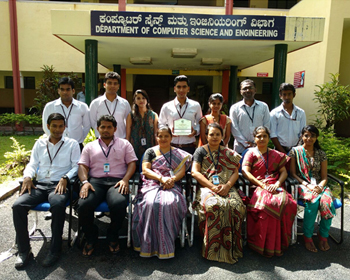
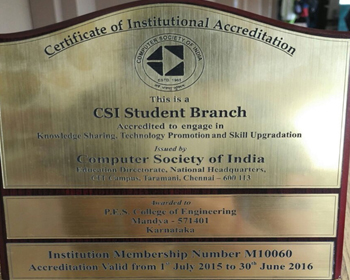
INAUGURATION
Objective:Inauguration of Computer Society of India (CSI) student chapter in P.E.S. College of Engineering, Mandya.
Date: 20th November, 2015
Time: 10.00 AM
P.E.S College of Engineering in association with Department of Computer Science and Engineering inaugurated the Computer Society of India student chapter on 20th November, 2016. The CSI chapter of the college consist of more than 75 students including core team members. The Inauguration started with a melodious invocation song which was followed by a welcome speech by the student chair Rukshar Ahmadi who welcomed our privileged guests and addressed the gathering. Our respected principal, Dr. V. Sridhar was the chief guest to this function. Dr.Rajkumar Vedam Consultant Engineer, Houston, Texas, US inaugurated the CSI student chapter by lighting the lamp, in presence of professor and head of department of CSE, Dr M.C. Padma, Smt. Mamatha B.S SBC, CSI-Student chapter, and all the professor of department of computer science
The event proceeded with the address speech of our beloved HOD who enlightened the students on the future goals of the chapter and shared her vision with the student. The event was more successful after the technical talk on Listening, Communication and, Career Opportunities was delivered by Mrs. Vathsala S Bhat, Dean at RIIT Mysuru. The inauguration went ahead with a short quiz event followed by vote of thanks. The overall feedback was quite positive and we hope to conduct more number of events in the upcoming days.
GNU/LINUX USER'S GROUP P.E.S. COLLEGE OF ENGINEERING, MANDYA


GNU/LINUX Users have formed a group called GLUG in P.E.S. College of Engineering, Mandya. The main objective of this group is to provide awareness of free software in students. Free software means software that respects user's freedom and community. Roughly, it means that the users have the freedom to run, copy, distribute, study, change and improve the software. Thus, "free software" is a matter of liberty, not price. To understand the concept, you should think of "free" as in "free speech", not as in "free beer". GLUG campaign for these freedoms because everyone deserves them. With these freedoms, the users (both individually and collectively) control the program and what it does for them. When users don't control the program, we call it a "non-free" or "proprietary" program. The non-free program controls the users, and the developer controls the program. This makes the program an instrument of unjust power. This group is strongly supported by Free Software Movement of Karnataka (FSMK) group.
GLUG, PESCE is active in conducting technical events like regular workshops, Hands-on sessions, conferences, etc. GLUG is co-ordinated by Dr. Minavathi, Professor, PESCE, Mandya.
Table below gives a brief report of GLUG, PESCE activities from 2015 to 2019:
| DATE | ACTIVITY | RESOURCE PERSON |
|---|---|---|
| 17-08-2015 | Orientation | Mr. Rakesh. P, alumni of PESCE, database administrator in SPAN INFOTECH , Executive member, FSMK Organization , Bangalore |
| 29-08-2015 | OSM Tracking Using Android App | Rakesh. P and Shijil Executive members FSMK Organization , Bangalore |
| 29-08-2015 | Session on PHP | Mr. Manu, VTIGER, Bengaluru and Alumni PESCE, Mandya |
| 12-09-2015 | Xubuntu, LINUX Installation Fest | Rakesh, Manu, Vishal and Shijil from FSMK |
| 03-10-2015 | Introduction to basic commands in Linux | Ramyashree P.M and Vaibhav Vishal volunteers of GLUG, PESCE |
| 17 & 18th Oct, 2015 | "DRUPAL" Workshop | Rameez Thonnakkal, joint secretary,FSMK Organization and Shijil Executive member FSMK Organization , Bangalore |
| 19-10-2016 | Introduction to Linux | Shubodip Ghosh and AmoghaVarsha, GLUG core member, PESCE, Mandya |
| 06-11-2016 | Java Chat application | Nootan, GLUG core member, PESCE, Mandya |
| 03-02-2017 | Linux Installation Fest | Praveen Kumar B. N. and Amoghavarsha, GLUG core members |
| 09-02-2017 | Introduction to OSS and Free Software | Anup Pravin, alumni of PESCE and an FSMK member |
| 16-02-2017 | Basic Commands in Linux | Harshitha. R, Anant Mohan and Sindhu, GLUG core members and FSMK members |
| 01-03-2017 | Shell Scripting | Amoghavarsha, GLUG core member, PESCE, Mandya |
| 16-03-2017 | Shell Scripting | Amoghavarsha, GLUG core member, PESCE, Mandya |
| 20th to 24th January, 2019 | Residential Camp – “FSMK Winter Camp’ 19” | Dr. Richard Stallman, GLUG & FSMK core members |
PLUG-IN
It’s not for you, it’s you
Origin
Plug-In is the club which started to help the ECE department students in all the aspects to achieve the proficiency. It was the idea of Adarsh H R, Ganesh R Bhat, Ullas Gowda G L and Nandish Urs N (2013 batch students). It is the only club that has got intiated after 20 long years of closing the great HAMMING club of our department. It is the only club that our department has still today and operated by students only. It has been around one and half year of its establishment in which it has organized many events and few intra college events too from our supporting team. Today we have around 170 students who are there in our club and we are guided by our faculty advisor Mahesh Koti, Associate Professor of ECE department.
What is Plug-In????
Plug-In is a technical group which operates on behalf of ECE Association. Plug-In conducts both technical and non technical events. Through the activities which we conduct we are trying to enhance the skills of the individuals and making them to understand their potential, their talents in handling the situation and finding the best way to stand as a winner.
Moto of Plug-IN
The moto of PLUG IN is,
- To have a honest approach to explore the domain….!
- To provide the platform for the students to carve the best version…..!
- To create a tour to the mysterious world of technology…..!
- Last but not the least, to motivate the students to develop self confidence, discipline and leadership qualities which will help them to build their professional life……
Activities conducted by Plug-In
| Event Name | Year | Description |
|---|---|---|
| Quiz-In | 2015-16 | This was the first activity conducted by Plug-In. The topics were mainly on basic electronics. |
| Talk-In | 2015-16 | This was a technical talk by Dr K A Radhakrishna Rao on Digital Image Processing. It was an industrial interaction with the students. |
| Quest-In | 2016-17 | It was a treasure hunt event and was the most successful event organized by Plug-In wherein 200 students participated in the event. |
| Fumour | 2016-17 | This was organized mainly to see the creativity and thinking ability of the students. |
| Code-Kshetra | 2016-17 | It was a programming event where all the IT department students were allowed to participate, and it was organized twice. |
| Adzap | 2017-18 | It was organized to check the managerial and thinking skills of the students. |
| MATLAB | 2017-18 | This was a workshop organized for the students of the ECE department. |
Even Plug-In organized social activitiy. We thought about operating Computer to the government students who were not aware of that and our beloved HOD Dr K A Radhakrishna Rao sir also donated a Computer to the school.
Plug-In Core team
| Posts | Name |
|---|---|
| President | Vinutha Singh S |
| Vice President | Anupama K M |
| Secretary | Spandana H N |
| Joint Secretary | Meghana M R |
| Treasurer | Kuthejatul Kubra |
| Editor | Anushree Pai G |
| Director of Networking | Pratheek P |
| Director of Technical activities | Disha J H |
| Director of Communication | Faisal Mahmood |
| Webmaster | Harshitha G |
| Director of Membership | Abhilakhi N |
| Pooja J P | |
| Director of Social activities | Ravi Kiran K B |
Hack Club
Hack Club PESCE, Mandya
A group of students with passion to learn and develop. A technical club "By the students-For the students". We learn by making and we enjoy making different fun and awesome projects. The point is to learn and develop technical skills while making friends and enjoying the journey. We want to create a community where we can all discuss and work on skills like IoT, Web Dev, AI, Machine Learning, Robotics, Photography and more (There are other secret sects like Anime, Piracy, etc). This is a completely open community where you don't have to pay any money to join but you have to show us your interest and passion for making. Come join us and make something cool !!!!
| Name of the Research Guide | Designation | Email-Id |
|---|---|---|
| Dr. M C Padma | Professor | padmamc@pesce.ac.in |
| Dr. R Girish | Professor | write2girisha@gmail.com |
| Dr. Nagarathna | Professor | nagarathna@pesce.ac.in |
| Dr. H P Mohan Kumar | Professor & Head | mohankumar@pesce.ac.in |
| Dr. Vinay S | Professor | vinay@pesce.ac.in |
| Dr. M.Veena | Associate Professor | mveenakemps@gmail.com |
| Name of Research Scholars | University | Date of Award | Guide Name | Title of Research |
|---|---|---|---|---|
| Prathibha R.J | VTU | 20/04/2018 | Dr. M.C. Padma | Novel approaches to develop modules of source analysis for Kannada sentence in Machine translation system |
| Mohammad Ahmed ail Abdu alrhman | UOM | 18/06/2019 | Dr. M.C. Padma | Design of Robust Concept Drift Adoption Strategies for High Speed Data Stream Mining |
| Arjun U | VTU | 08/042022 | Dr. Vinay S | An Approach to enable the Data Integrity for Cloud Data Storage by Auditing |
| Manasa K N | UOM | 19/05/2023 | Dr. M.C. Padma | A Framework for Analysing the Intensity of Sentiments in Social Media |
| Prathibha R.J | VTU | 20/04/2018 | Dr. M.C. Padma | Novel approaches to develop modules of source analysis for Kannada sentence in Machine translation system |
| Veena M | VTU | 26/07/2023 | Dr. M.C. Padma | Techniques for early detection of Breast cancer using Multimodal images |
| Dr.M C Girish babu | VTU | 22/02/2024 | Dr. M.C. Padma | Techniques for Identification & Classification of Crops using satellite imagery |
| Dr.Chethan G S | VTU | 30/04/2024 | Dr.Vinay S | Design of dependable architecture for collaborative platform of educational big data on cloud environment |
| Dr.Chowdary K K | VTU | 23/08/2024 | Dr.R.Girisha | Regional Climate Change Study using HPC and Data Mining |
| Dr.Nitin Kumar | VTU | 23/09/2024 | Dr.Nagarthna | Early prediction and classification of mango fruit flies with seasonal activity using sensor network |
| Esraa Mohamand Jamil Alsariera | UOM | 30/12/2023 | Dr.Padma M C | |
| Deepika | VTU | 08/02/2025 | Dr.Nagarathna | Predictive Model for production enhancement in layer poultry farm using Machine Learning Techniques |
| Name | Guide Name | University/Research Center | Topic Status |
|---|---|---|---|
| R.S.Prasanna kumar | Dr S N Thimmaraju | VTU | Course work Completed |
| Veena M. | Dr. M.C. Padma | VTU | Comprehensive Viva Completed |
| Girish Babu | Dr. M.C. Padma | VTU | Comprehensive Viva Completed |
| Suraj B S | Dr. M.C. Padma | VTU | Registered and preparing for course work |
| Ramyashree H P | Dr. Minavathi | VTU | Comprehensive Viva Completed |
| Deepika | Dr. Nagarathna | VTU | course work Completed |
| Shwetha M K | Dr. Nagarathna | VTU | Registered and preparing for course work |
| Chaitra B P | Dr. M L Anitha | VTU | Registered and preparing for course work |
| V Chethan kumar | Dr. Umesh D R | VTU | Registered and preparing for course work |
| Shruthi P S | Dr. Umesh D R | VTU | Registered and preparing for course work |
| C Chethana | Dr. Deepu singh | VTU | Registered and preparing for course work |
| Bhavya D | Dr D S Vinod | JSS,Mysore | course work completed |
| Jayshankar | IIT,varanasi | course work completed | |
| Yoga B S | IIT,Roorkie | Registered |
| Name of Research Scholars | University | Guide Name | Title of Research | Status |
|---|---|---|---|---|
| Prathibha R.J | VTU | Dr. M C Padma | Novel approaches to develop modules of source analysis for Kannada sentence in Machine translation system | Completed |
| Mohammad Ahmed Ail Abdu Alrhman | UOM | Dr. M C Padma | Design of Robust Concept Drift Adoption Strategies for High Speed Data Stream Mining | Completed |
| Arjun U | VTU | Dr. Vinay S | An Approach to enable the Data Integrity for Cloud Data Storage by Auditing | Completed |
| Manasa K N | UOM | Dr. M C Padma | A Framework for Analysing the Intensity of Sentiments in Social Media | Completed |
| Veena M | VTU | Dr. M. C Padma | Techniques for early detection of Breast cancer using Multimodal images | Completed |
| Dr.M C Girish Babu | VTU | Dr.Padma M C | Techniques for Identification & Classification of Crops using satellite imagery | Completed |
| Dr.Chethan G S | VTU | Dr.Vinay S | Design of dependable architecture for collaborative platform of educational big data on cloud environment | Completed |
| Dr.Chowdary K K | VTU | Dr.R.Girisha | Regional Climate Change Study using HPC and Data Mining | Completed |
| Dr.Nitin Kumar | VTU | Dr.Nagarthna | Early prediction and classification of mango fruit flies with seasonal activity using sensor network | Completed |
| Esraa Mohamand Jamil Alsariera | UOM | Dr.Padma M C | Completed | |
| Deepika | VTU | Dr.Nagarathna | Predictive Model for production enhancement in layer poultry farm using Machine Learning Techniques | Completed |
| Suraj B S | VTU | Dr.Padma M C | Sentiment analysis model for recognizing fake reviews using opinion mining | CV Completed |
| Prathibha S | VTU | Dr.Vinay S | A Machine Learning Approach for Anomaly Detection system in Cloud | CV Completed |
| Raghavendra K | VTU | Dr.Vinay S | A Swarm intelligence based Approach to towards Sensor Selection Clustering and Information Fusion inIoT | Waiting For Conducting Open Seminar |
| Sunil M E | VTU | Dr.Vinay S | Analysis of Subjective Information in Public Platforms Using Machine Learning Techniques | Waiting for Thesis Submission |
| Chethan Kumar V | VTU | Dr.D R umesh | Assistive system for improvisation of behaviour of intellectually disabled children(autism) over wireless body area network using big data analytics | Waiting for Conducting Final viva |
| Shruthi P S | VTU | Dr.D R umesh | A Study of Multidimensional Analysis in Analytics for Quality Optimization | Waiting for Conducting Final viva |
| Shivashankar S K | VTU | Dr.Mahesh Kaluti | Enhancing Efficiency of Routing Protocol in MANET”s using An Artificial Neural Network (ANN) with Machine Learning Approach. | Registered For Course Work Exam-2022 |
| Meghana M | VTU | Dr.Nagarathna | Predicting Legal Outcome based on Artificial Intelligence and Deep Learning Techniques | Registered For Course Work Exam-2022 |
| Raksthitha. M.S | VTU | Dr.Vinay S | Traceability System based on Block chain. | Pusuing Course Work |
| Vishesh. J | VTU | Dr. R Girisha | Customer Behavior Analysis with the Help of Historical Purchase data using Artificial Intelligence. | CV Completed |
| Dinesh S D | VTU | Dr.Vinay S | Gait Pattern Analysis for Gait Identification Using Topic Model included Multiplovien | Colloquim Completed |
| Sachith B K | VTU | Dr.D R umesh | Curvilinear Text Detection and Recognition from Multi View Image Scenes. | Cv Completed |
| Sindhu P | VTU | Dr.Padma M C | Digital Forensics-Based Malware Detection Using Machine Learning | Course Work Completed |
| Srujana B J | VTU | Dr.Vinay S | Disease Detection and Classification in Chrysanthemum Flowers using Deep Learning Approach. | Course Work Completed |
| Vinutha M S | UOM | Dr.Padma M C | A Framework for Search Engine Optimization by Hamessing Natural Language Processing and Machine Learning Techniques. | |
| Sindhu B S | VTU | Dr.Minavathi | Microscopic imange analysis for the Diagnosis of cancer using Generative AI Tecnology | Registerd |
| Bhavya M R | VTU | Dr.R Girish | Computational model for brain tumor detection and classification using deep learning and soft computing techniques | CV Completed |
| Varsha N | UOM | Dr.Padma M C | Secure User Engagement in online social networks using Deep contagion and Graph mining approaches with intergrated pseudonymization | Pusuing Course Work |
| Fahad Abdullah Ghanem Mohammed Nasser | VTU | Dr.Vinay S | Automatic Short Text Summarization Approaches for Social Media Data. | Waiting for Thesis Submission |
| Sharaf H M Almosalami | UOM | Dr.Padma M C | Pusuing Course Work |
| Faculty | Topic | Application Number | Status |
|---|---|---|---|
| Deepika Dr. Nagarathna |
An automated system to predict air quality index in layer poultry farm Using deep learning techniques | 202441027160 A | Published |
| Ms. Srujana B J Dr. Vinay S |
Disease detection and classification in chrysanthemum flowers using deep Learning approach | 202441029970 A | Published |
| Deepika | Mobile application development for recognizing ayurvedic medicinal Plants using deep learning methods | 202441027221 A | Published |
| P. Prasanna Dr. Umesh D. R S.K Shivashankar |
Olympics game analysis tool using machine learning | 202441027159 A | Published |
| Uma S K | Sign language recognition system for hearing and speech impaired people Using machine learning | 202441027157 A | Published |
| Dr. Umesh D. R P. Prasanna Chetan Kumar V |
Modeling and formal specification of smart mass transit railway Interlocking system | 202441027225 A | Published |
| Dr.Nagarathna Dr. Vinay S Mr. Pramod Kumar B M |
An AI enabled solar panel rotation system | 202341016403 | Published |
| Dr.Anitha M L Dr. Vinay S |
Predicting child mental stress using AI | 202341016400 | Published |
| Dr. D R Umesh | IOT-Enhanced Alternate Pair Furrow Irrigation System For Sustainable Water Management In Sugarcane Cultivation | 202341082020 | Published |
| Bhavya D | Root Cause Analysis, Threat Interpretation, and Network Survivability Prediction Device for Heterogeneous Networks | 202141000707 | Published |
| Chethana C | Automated Driving Assistance System | 202141019449 | Published |
| Investigator | Project title | Year | Funding agency | Amount | Duration | Status |
|---|---|---|---|---|---|---|
| Dr.Vinay.S | New Age Incubation Network(NAIN) | 2021-2023 | Government of Karnataka | 1.2crore | 2021-2023 | Completed |
| Dr.Deepika | IOT Project | 2024 | Government of Karnataka | 1,30,000 | ||
| Bhavya.D | Solid Waste Management System | 2024 | Government of Karnataka | 1,87,500 |
Network Forensic
Network forensics is a subfield of digital forensics where evidence is captured from networks and interpretation is substantially based on knowledge of cyber attacks. It aims to locate the attackers and reconstruct their attack actions through analysis of intrusion evidence. Major technical challenges facing network forensics analysis: Current sources of intrusion evidence such as IDS alerts are not well adapted for forensics investigation. Cyber attacks are increasingly sophisticated. Short response times. Major objectives of network forensics analysis can be summarized into two fundamental problems: attack group identification and attack scenario reconstruction. Attack scenario reconstruction is the process of inferring step-wise actions taken by the attacker to achieve his malicious objective. Attack group identification is the task of discovering the group of hosts involved in the attack and determining the roles of each host in the group.
The main objectives of our proposed project are
- Detection of TCP SYN flooding
- Detection of UDP flooding
- Estimation of Throughput of the network
- Filtering of Packets
- Detection of Routing Protocol
- Finding Round Trip Time
Getting other application protocol details for analysis like DNS-protocol This project concentrates on taking care of Deformed Packets with appropriate flags, Aggregation and reassembly of packets. It is not dependent on NIC and it is a Hardware engine. Thus there Tuning intrusion prevention and detection solutions
Data Science
Data Science is a subject of Computer Science aimed at building machines and computers that can enhance logical operations. AI systems have the ability to execute tasks naturally associated with human intelligence, like speech recognition, decision-making, visual perception, and translating languages.
Machine Learning is one of the widely used algorithms of AI. The learning process involves the enhancement of new declarative knowledge, the advancement of cognitive and motor skills through practice or instruction. Since the beginning of the computer era, researchers and scientists have been trying to implant such abilities in computers. Solving this issue has been, and remains, most fascinating and challenging long-term goal in AI.
Some of the applications of Data Science are as follows:
Natural Language Processing
NLP is a method in which computers are made to understand, execute and manipulate human language. To reach this goal, a computer should be able to “understand” a large amount of data – from grammar syntax and rules to various accents and colloquialisms. Whereas a speech recognition system, for example, manual speech becomes audio data, which then turns into text data, a complex process itself. This text data can be implemented in an “intelligent” system for different applications such as controlling devices or translators.
Computer Vision
Computer vision is the science of manipulating or understanding videos and images. It has many applications, comprising of augmented reality, autonomous driving and industrial inspection. The implementation of deep learning for computer vision can be differentiated into many categories: detection, generation, segmentation and classification, both in videos and images.
Financial Services
Companies in the financial sector are able to identify key insights in financial data as well as prevent any occurrences of financial fraud, with the help of machine learning technology. The technology is also used to identify opportunities for investments and trade. Usage of cyber surveillance helps in identifying those individuals or institutions which are prone to financial risk, and take necessary actions in time to prevent fraud.
Marketing and Sales
Companies are using machine learning technology to analyze the purchase history of their customers and make personalized product recommendations for their next purchase. This ability to capture, analyze, and use customer data to provide a personalized shopping experience is the future of sales and marketing.
Government
Government agencies like utilities and public safety have a specific need FOR Ml, as they have multiple data sources, which can be mined for identifying useful patterns and insights. For example sensor data can be analyzed to identify ways to minimize costs and increase efficiency. Furthermore, ML can also be used to minimize identity thefts and detect fraud.
Healthcare
With the advent of wearable sensors and devices that use data to access health of a patient in real time, ML is becoming a fast-growing trend in healthcare. Sensors in wearable provide real-time patient information, such as overall health condition, heartbeat, blood pressure and other vital parameters. Doctors and medical experts can use this information to analyze the health condition of an individual, draw a pattern from the patient history, and predict the occurrence of any ailments in the future. The technology also empowers medical experts to analyze data to identify trends that facilitate better diagnoses and treatment.
Transportation
Based on the travel history and pattern of traveling across various routes, machine learning can help transportation companies predict potential problems that could arise on certain routes, and accordingly advise their customers to opt for a different route. Transportation firms and delivery organizations are increasingly using machine learning technology to carry out data analysis and data modeling to make informed decisions and help their customers make smart decisions when they travel.
Oil and Gas
This is perhaps the industry that needs the application of machine learning the most. Right from analyzing underground minerals and finding new energy sources to streaming oil distribution, ML applications for this industry are vast and are still expanding.
Proposed Data Science will be set up at the institute level and it can be used by students or faculty members of any engineering department. AI and ML have varied applications across different engineering streams.
Internet of Things
Center of Excellence on Internet of Things (IoT) is established for carrying out projects and research work by Undergraduate/Post Graduate students and Research students/faculties at Department of Computer Science and Engineering, PES College of Engineering, Mandya. The above said laboratory has the overall goal of identifying and providing solutions for the real life problems and also research problems. As an outcome of the established laboratory, a number of projects on Internet of Things were developed by a number of talented UG/PG students. Some team members are working in collaboration with different start- up companies/ practitioners to address the real life problems and to give solutions for the societal issues.
Various components used for developing a number of projects on different types of problems are given below. 1. Gold pack of Zolertia Device ( 10 no’s ) 2. Zolertia gateway 3. Arduino UNO R3 board with DIP ATmega328P 4. Arduino Yun 5. Arduino Ultrasonic Range Finder Module Sensor Distance Measuring Transducer 6. Microphone sound sensor module 7. MQ-7 Carbon Monoxide Detection Sensor 8. Ethernet W5100 Shield Network Expansion Board w/ Micro SD Card Slot 9. Electronic Components {Bread boards, Jumper, cables, LED's, Resistors, Capacitors, Transistors} 10. Finger-clip Heart Rate Sensor with shell 11. Serial Camera Kit 12. PIR Motion Sensor - Large Lens version 13. GSR sensor 14. GPS Module 15. EMG Detector 16. Wind Speed/ Direction Sensor 17. Fingerprint Sensor 18. Water Flow Sensor 19. Adult reusable NIBP cuff 20. Raspberry Pi 2 Model B 1GB 21. Soil moisture sensor 22. Water level switch 23. Flame Sensor
Methodology 1. Internet of Things (IoT) Laboratory has been established with the required facilities for implementing the projects on various problems chosen from the societal issues. 2. Interaction with various experts from different start-up companies/ practitioners to address the real life problems. 3. Best possible solutions are developed by using the equipments in the Internet of Things (IoT) Laboratory. 4. Challenges in developing solutions for some more realistic problems are the focus of forthcoming days. Outcome: A number of projects on Internet of Things are developed by a number of talented UG and PG students.
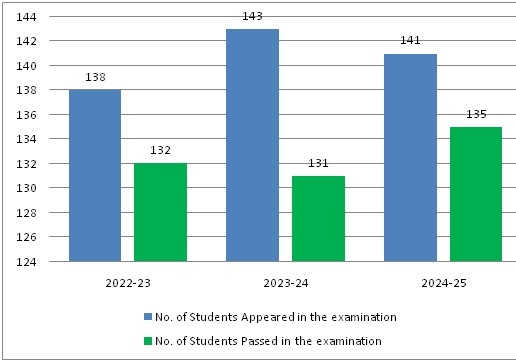


Happenings @PESCE CSE Explore community & culture at PESCE CSE & discover what's happening around the campus.
19 November 2025

10 November 2025
5-day Skill Development Program on “Mathematical...
P. E. S. College of Engineering, Mandya
Read more
04 November 2025

27 October 2025
5-day Skill Development Program on "Academic ...
Department of Computer Science and Engineering
Read more
24 October 2025
Congratulations to U Nandini and Sharanya K
Department of Computer Science and Engineering
Read more
24 October 2025

18 October 2025

13 October 2025

06 October 2025

06 October 2025

30 September 2025

30 September 2025

30 September 2025

29 August 2025

27 August 2025
MongoDB Online Orientation Program for the Faculty
P. E. S. College of Engineering, Mandya
Read more
20 August 2025
Mastering Outcome-Based Assessment and NBA SAR Doc...
P. E. S. College of Engineering, Mandya
Read more
20 August 2025

20 August 2025

20 August 2025

10 July 2025

03 July 2025




































